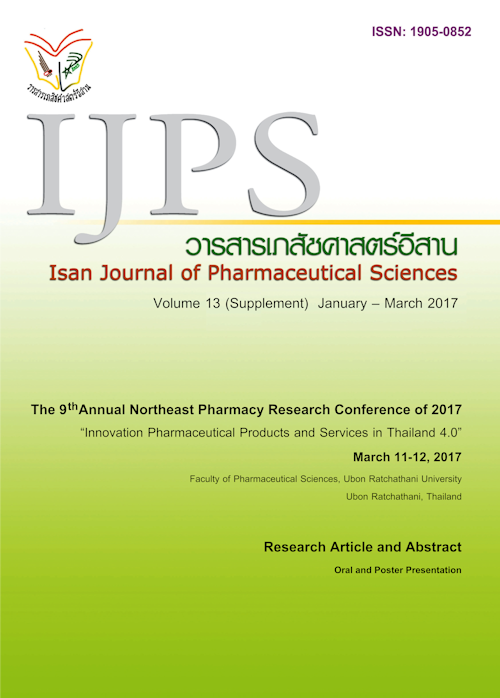Business construction of drugs and health products by advertising of radio stations : Study in the province in the Northeastern Region.
Main Article Content
Abstract
Introduction: Perception of drugs and health productsu properties from the media influenced consumers' buying behavior, especially the perception from the advertisements on the radio. It was a marketing strategy that promoted product sales, but at the same time, some advertisements were beyond reality and illegal, convincing people to buy products and causing harm to their health, which was unfair to consumers. The purposes of this study were to examine the pattern of the radio program in the entrepreneurs and relevant individualsu point of view. Methods: This is a qualitative study. In-depth interviews were used with 5 radio station entrepreneurs, 5 product owners and 3 media producers, which were conducted during June - August 2016. The content analysis was used to analyze the data and verified with data triangulation. Results: Prior to receiving the advertisements, texts were verified for correction and the license was checked. The advertisements were given directly to the radio station and through provincial agents. The pattern of advertisements in the programs was that the product owner would sponsor the entire program and advertisements of secondary sponsors would be spoken in the program and aired for a short time. Some radio station entrepreneurs were involved in drug and health product business and distributed the products by themselves. In terms of advertisement production, the advertisements were produced by the product ownerus company and publicized by the disc jockeys mentioning the products to convince people, informing the distribution place and thanking for sponsoring the program. Conclusion: According to the study, it reflected the supportive relationship between the radio station and drug and health product advertisements which had existed for a long time, even though the pattern had changed. However, these two businesses inevitably relied on each other. The supporting factors were 1) the disc jockeys, 2) the budget, 3) the advertisement production and 4) management of the radio station, all of which made the drug and health product advertisements via radio possible with the strengths and advantages appropriate for the target group in the community.
Article Details
In the case that some parts are used by others The author must Confirm that obtaining permission to use some of the original authors. And must attach evidence That the permission has been included
References
Chamnaekpon P. Study on Knowledge of Local Radio Personnel concerning Drugs and Foods Spokespersons in Government District 1 as of Fiscal Year 2009. Foods and Drugs Journal 2010; 17:33-40.
Hengmo P. Approach to Develop Local Radio Station Operation in Mae Sod District, Tak Province. [Master of Arts Thesis, Development Strategy Department] Kamphaeng Phet Rajabhat University, (n.d).
Jaengjai D. Testing of Problem-Solving Methods for Illegal Health Product Advertisement on Radio. [Master Thesis]. Prince of Songkla University; 2012.
Lomas K. The Situation of Radio Advertisement of Drug And Food Claimed as Drug in Phraibueng Municipality, Sisaket Province. [Master Thesis]: KhonKaen University; 2012.
National Council for Peace and Order Notification No. 79/2557 on Terms and Condition for Broadcasting of Radio Stations Authorized to Test the Operation [Date 9th July 2014]
National Statistical Office. Report of Media Survey B.E. 2007 (Radio and Television) [Research Report]. Bangkok: Statistical Forecasting, National Statistical Office; 2007.
Pinyonithikasem D. Supervision Measures and Enforcement of Law on Health Product Advertisement. [Master of Laws Thesis]. Ramkhamhaeng University; 2003.


